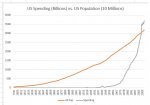- Joined
- Aug 24, 2013
- Messages
- 14,803
- Reaction score
- 11,542
- Location
- Red Colorado
- Gender
- Male
- Political Leaning
- Independent
Normalcy Bias (from Wikipedia):
Some believe - and I've actually read comments here to this effect - that "debt is good," that the United States has "unlimited borrowing power" and that we have unlimited resources to fund our debt, that we can print all the money we need - that as a nation, we can never experience fiscal, economic collapse. Personally, I think such attitudes are indicative of normalcy bias. Just because we've never faced the sort of fiscal demise we do now (the great depression notwithstanding) does not mean America can never fall prey to our own excesses, to our own fiscal irresponsibility. And consequently, we see two totally diverse factions on this debate - as much ideological as anything, but many on BOTH sides, as evidenced by the general apathy for, and lethargy to act that I see among the general populace. Despite the issue, people are going about their normal daily affairs as if all this will eventually work itself out.
Your thoughts...
Do Americans, in general, suffer from normalcy bias when it comes to this nation's pending fiscal dangers?
We could apply the definition to a lot of things, but given the fiscal issues we're facing seem to be at the forefront of people's minds, it seems appropriate to ask the question in that context.The premise here of course is that we ARE facing a pending fiscal disaster. I'm not talking about whether or not we raise the debt ceiling - though sadly, I think we must. I'm talking about the fiscal decisions we've made that have gotten us into this mess in the first place.The normalcy bias, or normality bias, refers to a mental state people enter when facing a disaster. It causes people to underestimate both the possibility of a disaster occurring and its possible effects. This often results in situations where people fail to adequately prepare for a disaster, and on a larger scale, the failure of governments to include the populace in its disaster preparations. The assumption that is made in the case of the normalcy bias is that since a disaster never has occurred then it never will occur. It also results in the inability of people to cope with a disaster once it occurs. People with a normalcy bias have difficulties reacting to something they have not experienced before. People also tend to interpret warnings in the most optimistic way possible, seizing on any ambiguities to infer a less serious situation.
Some believe - and I've actually read comments here to this effect - that "debt is good," that the United States has "unlimited borrowing power" and that we have unlimited resources to fund our debt, that we can print all the money we need - that as a nation, we can never experience fiscal, economic collapse. Personally, I think such attitudes are indicative of normalcy bias. Just because we've never faced the sort of fiscal demise we do now (the great depression notwithstanding) does not mean America can never fall prey to our own excesses, to our own fiscal irresponsibility. And consequently, we see two totally diverse factions on this debate - as much ideological as anything, but many on BOTH sides, as evidenced by the general apathy for, and lethargy to act that I see among the general populace. Despite the issue, people are going about their normal daily affairs as if all this will eventually work itself out.
Your thoughts...
Do Americans, in general, suffer from normalcy bias when it comes to this nation's pending fiscal dangers?

